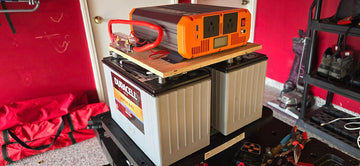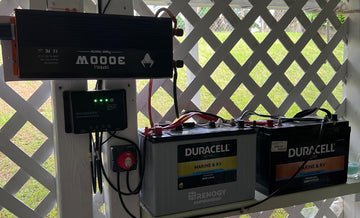Batteries come in a variety of voltages, with 6V and 12V being two common models. To make the right choice for powering your equipment, you need to understand the difference between 6V and 12V batteries.
Inside this Article:
- Difference between 6V and 12V Battery
- How to make a 6V or 12V lithium battery
- Uses of 6V batteries
- Pros and Cons of 6V batteries
- Uses of 12V batteries
- Pros and Cons of 12V batteries
- Cost comparison of 6V and 12V batteries
- 6V and 12V batteries: Factors to consider when purchasing
- 6V or 12V battery for RV: which one is better?
- Can a 6v battery drive a 12v motor?
- Can I replace my 6v to 12v batteries?
- What is a full charge on a 6v battery?
- How to maintain a 6v battery?
Difference between 6V and 12V Battery
The differences between 6V and 12V batteries include voltage, capacity, and application. The lower voltage and capacity of 6V batteries compared to 12V batteries make them suitable for devices and applications that require less power. 12V batteries require longer charging times than 6V batteries.
- Voltage differences: 6V batteries have a lower voltage than 12V batteries.
- Capacity differences: 12V batteries typically have a higher capacity than 6V batteries.
- Application note: The choice between 6V and 12V batteries depends on the specific power requirements of the application.
6V and 12V batteries differ in voltage, capacity, and application. Understanding these differences can help in selecting the right battery for a specific power requirement. In addition, the selection of a battery charger depends on factors such as battery type, charging requirements, and required accuracy.
How to make a 6V or 12V lithium battery
Do you want to know what makes the difference between them? Let's explore the process of making a 6V or 12V battery, using lithium batteries as an example here.
6V Lithium Battery
To make a 6V battery, you need to connect two 32700 lithium-ion cells in a 2s1p series. Typically the LiFePO4 variant is used. Connect the positive (+) terminal of the first cell to the negative (-) terminal of the second cell with connecting wires, and connect the positive and negative terminals at each end of the battery pack to form a 6V battery pack. Use electrical tape or heat shrink tubing to wrap the connections to ensure good insulation on the connection wires.
A 12V battery typically consists of two or three lithium batteries connected in series. Primarily, 18650 lithium-ion batteries are used to make the batteries. These lithium batteries have over 250 charge cycles and are compatible with high-current draw devices.
You will need three 18650 lithium-ion batteries, the Turn On 3S 6 Amp Battery Management System, 0.15 mm coated nickel strips, a battery system connector, 100 mm PVC heat shrink tubing, and a JST XH 2.54 4-pin female connector.
Take a battery and connect its positive terminal to the charger. Then, take the negative terminal and connect all three in series. Then, wrap 100mm PVC shrink tubing around the unit and install it on the back of the battery.
See more: 10 Exciting Ways To Use Your 12V Lithium Batteries
Uses of 6V batteries
6V batteries are a common battery size that can be used in the following areas
Recreational vehicles or campers
In general, two 6V batteries can be obtained with better battery capacity and higher amperage. This means using 6-volt batteries. You can run your trailer or RV longer than with 12-volt batteries. Best of all, their lightweight and portable design makes them a great choice for storage in tight spaces like a trailer or RV.
Lighting
The next most common use for 6V batteries is to power lighting equipment. Flashlights are often connected to batteries, and the best thing about using 6V batteries is that they provide longer life and a better lighting experience throughout their lifecycle.
Small electric vehicles and golf carts
Because of their long cycle life, 6V batteries are primarily used to power electric vehicles and golf carts. Instead of using one or two 12V batteries, cars are powered by a series of 6V batteries.
The lower discharge rate and faster heat dissipation allow the vehicle to run longer. In addition, the use of 6V batteries reduces vehicle maintenance costs.
Emergency Power for Small Electronic Devices
6V batteries are also used to provide emergency power for computers, televisions, and other household appliances. Some safety devices such as alarms, doorbells, and smoke detectors are also powered by 6V batteries.
Camping and hiking
Hikers and campers also use 6V batteries during their travels. Smaller 6V lithium batteries can effectively power flashlights, headlamps, and even small electronic devices during camping and hiking trips.
Pros and Cons of 6V batteries

Pros
- 6V batteries are typically small and lightweight, making them suitable for use in some portable devices and easy to carry and replace.
- Compared to higher voltage batteries, 6V batteries are usually less expensive, making them suitable for some applications with a limited budget.
- Because of the relatively low voltage, 6V batteries may be safer for use in some low-power devices.
Cons
- Because of their lower voltage, 6V batteries may not provide adequate electrical support for some high-power devices.
- 6V batteries are not widely available, and it may be difficult to find a suitable replacement.
- 6V batteries are relatively easy to discharge and have a shorter lifespan, requiring more frequent replacement or recharging.
Uses of 12V batteries

Electric Vehicles
12V batteries are primarily used to power electric vehicles such as RVs , campers, wheelchairs, scooters, golf carts, and more.
Due to the high power requirements of these vehicles, 1 2V batteries are ideal. The batteries provide constant power and can power the vehicle immediately.
Some small solar systems use 12V batteries to store solar energy collected during the day to power the vehicle at night or on cloudy days. Due to their higher storage capacity and deep-cycle technology, the batteries deplete more slowly and recharge more quickly.
12V lithium batteries are great for powering large appliances like computers, laptops, televisions, smart TVs, and more. The high storage capacity allows you to work on your computer all day without having to recharge your 12V battery frequently.
It can also power a small house or cabin, stair lifts, sweepers, yachts or small sailboats, fishing boats, and more.
Pros and Cons of 12V batteries
The use of 12V batteries offers several advantages including cost effectiveness and availability. However, there are some drawbacks to consider, including higher initial costs, higher maintenance requirements, inefficiencies, and possible safety hazards if not handled properly.

Pros
- Widely applicable to many devices and systems.
- Voltage remains constant throughout the life cycle.
- The voltage of a 12V battery is moderate enough to provide enough energy to support the operation of equipment, but not too high to cause safety issues.
- Some rechargeable 12V batteries have a long lifespan and can be charged and discharged multiple times.
Cons
- Batteries are larger and heavier. Can be cumbersome for some applications.
- 12V batteries are typically more expensive than 6V batteries.
Cost comparison of 6V and 12V batteries
Cost is an important factor to consider when comparing 6V and 12V batteries. While 12V batteries may have a higher initial cost, they typically offer higher voltage and capacity, making them more cost-effective in the long run. However, 6V batteries may be lighter and more portable.
- Cost Comparison: 12V batteries may have a higher initial cost, but they are more cost-effective in the long run due to their higher amp hours.
- Portability: Compared to 12V batteries, 6V batteries are lighter and easier to carry.
- Weight and Versatility: 12V batteries are more versatile and suitable for a wide range of applications. 6V batteries have a relatively limited range
When comparing 6V and 12V batteries, it is important to consider cost, amp-hours, weight, and versatility. By evaluating these factors, you can determine which battery option is best for your specific needs and application.
6V and 12V batteries: Factors to consider when purchasing
There are several factors to consider when choosing between 6V and 12V batteries. These factors include voltage, power, compatibility, physical size, cost, and performance. It is important to evaluate these factors based on your specific needs and requirements. In addition, consider battery type, charging requirements, etc. when selecting a battery charger.
- Voltage requirements: When choosing between 6V and 12V batteries, consider the voltage requirements of the application.
- Power output: Evaluate the power output of the battery to ensure it meets your needs.
- Compatibility: Check the compatibility of the battery with your equipment or system.
- Physical size: Consider the size and dimensions of the battery to ensure it is suitable for your application.
- Cost: Evaluate the cost of the battery and choose one that fits your budget.
- Performance: Compare the performance characteristics of the batteries to ensure they meet your performance requirements.
By evaluating these factors, you can make an informed decision and select the battery that best meets your specific needs and requirements.
6V or 12V battery for RV: which one is better?
Two 6V batteries in series provide higher capacity and better deep discharge handling.
- Increased power capacity: Two 6V batteries in series provide more power capacity than a single 12V battery.
- Better deep discharge handling: 6V batteries generally handle deep discharge better, making them suitable for RV applications.
By using two 6V batteries in combination, you can get more current per hour while maintaining a constant voltage output. As a result, you get more power from your batteries for longer periods. Best of all, charging times are shorter.
If you need long periods of off-grid use, greater total capacity, and more consistent voltage output, choosing two 6V batteries may be more appropriate. However, if you are more concerned with ease of installation, space efficiency, and cost, it may be more practical to choose a single 12V battery. The best choice should be based on your specific needs, budget, and application.
Can a 6v battery drive a 12v motor?
A 6V battery can power a 12V motor, but it will result in reduced motor speed and torque. The motor will not run at full capacity - it will run at half the speed it should, so the motor may not operate properly or perform as expected. The most important thing to consider is factors such as the current capacity of the motor and the potential for motor damage.
- Reduced motor speed and torque: Running a 12V motor on a 6V battery will result in reduced speed and torque output.
- Current capacity: Consider the current capacity of the motor and make sure it is within the capacity of the 6V battery.
- Possibility of motor damage: Running a motor at less than its rated voltage can cause stress and possible damage to the motor.
While it is possible to run 12V motors on 6V batteries, potential drawbacks such as reduced speed and torque must be considered. It is critical to ensure that the current capacity of the motor is compatible with the 6V battery to avoid motor damage. It is therefore advisable to select a suitable power supply to match the voltage requirements of the motor.
Can I replace my 6v to 12v batteries?
Replacing a 6V battery with a 12V battery is not a simple substitution because the two batteries have different voltage outputs and this substitution may result in damage or improper operation of the unit. Here are a few factors to consider:
- Voltage matching: Devices are usually selected for a specific voltage rating based on design requirements. If a 6V battery is replaced with a 12V battery, the device may not be able to handle the higher voltage, resulting in device malfunction or damage.
- Circuit design: The circuitry and components of a device are usually designed for a specific voltage range. Changing batteries may subject circuit components to unadapted voltages, resulting in damage.
- Power requirements: The power requirements of the device are another important consideration. Higher voltage batteries may provide too much power, overloading device components and damaging the device.
- Power capacity: Compare the power capacity of 6V and 12V batteries to ensure they meet the requirements of the application.
- Cost: Evaluate the cost impact of replacing a 6V battery with a 12V battery.
Consider these factors when making your decision. By considering these factors, you can make an informed decision about which battery will best meet your specific needs and requirements.
What is a full charge on a 6v battery?
Changes in charge level result in changes in voltage, which rises when charging and falls when discharging.
Batteries are made up of a combination of cells - a 6V lead-acid battery has 3 cells, each with a voltage of 2.35 - 2.4V when fully charged, so a fully charged 6V lead-acid battery will only have a voltage of 7.05 - 7.2V.
A 6V lithium battery is made up of two cells connected in series, with each cell having a full voltage of up to 4.2V, so a 6V lithium battery will have a full voltage of up to 8.4V when fully charged.
How to maintain a 6v battery?
Maintaining your 6V battery is one of the most important things you can do to extend its life.
Make sure the battery is always clean - there should be no corrosion or dirt on it. However, with lithium-ion batteries, a lot of energy can be saved on battery cleaning due to the sealed packaging.
It's a good idea to check the acid level regularly to make sure the battery has enough electrolytes. This will also allow the battery to run efficiently. This is especially true for lead-acid batteries; Lithium batteries require little maintenance in daily use and must be stored safely when not in use.
Use a smart charger to detect when the battery is fully charged. Alternatively, you can use a conventional charger to charge a 6V battery. However, you must be careful not to overcharge. Special chargers are required to charge lithium batteries, otherwise, battery life may be affected!

















